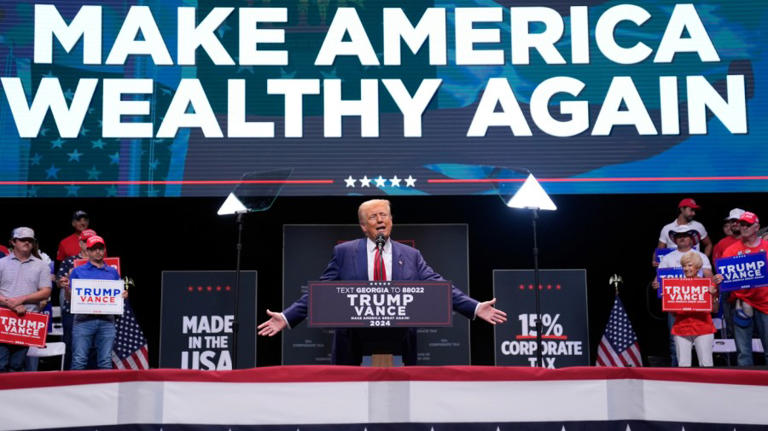In the ever-shifting landscape of American politics, a new slogan is gaining unexpected momentum: “Make America Healthy Again.” Once dismissed as a fringe sentiment, the phrase is now becoming a rallying cry for a growing number of young voters across the country. But while this may sound like a universally agreeable concept, its rise is causing quiet concern within Democratic circles — and for good reason.
A Shift Toward Health-Centric Politics
At its core, “Make America Healthy Again” reflects a broader frustration among the younger generation with the state of public health in America — from skyrocketing healthcare costs to food deserts, mental health crises, sedentary lifestyles, and preventable diseases. These voters are not only concerned about their own well-being but are also seeking systemic reforms that go beyond band-aid solutions.
This health-first movement is not confined to party lines. It blends libertarian ideals of personal responsibility with populist critiques of corporate greed — especially targeting pharmaceutical companies, insurance providers, and industrial food manufacturers. As such, it’s beginning to attract a wide ideological range of supporters, including disillusioned Democrats, independents, and even some young conservatives.
Why Democrats Should Worry
While the Democratic Party has traditionally positioned itself as the champion of public healthcare, the momentum behind “Make America Healthy Again” reveals a gap between rhetoric and reality. Many young voters feel that Democrats have failed to deliver meaningful reforms, especially after witnessing the compromises of the Affordable Care Act and the stalled efforts for Medicare for All.
The Biden administration has made strides in areas like capping insulin prices and expanding coverage through the Inflation Reduction Act. But these efforts, while commendable, are often seen as incremental and too focused on managing illness rather than preventing it.
Worse yet, many voters sense an uncomfortable closeness between establishment Democrats and corporate interests. The rise of health-focused grassroots movements is partly a backlash against this perceived coziness. These groups argue that truly making America healthy again requires confronting Big Pharma, Big Food, and even the lobbyist culture entrenched in Washington — all areas where young activists feel Democrats have fallen short.
The Role of Social Media and Influencers

The resurgence of this health-first ideology can be largely credited to platforms like TikTok, YouTube, and Instagram. Health influencers, fitness coaches, mental health advocates, and even conspiracy theorists have found common ground in critiquing modern lifestyle trends and promoting holistic well-being. Whether it’s about clean eating, gym culture, alternative medicine, or meditation, the core message is clear: America needs a health reboot.
These content creators have enormous reach, often surpassing mainstream politicians in engagement and trust among Gen Z and Millennials. When these influencers amplify messages like “Make America Healthy Again,” they inject them with authenticity and urgency — traits often lacking in traditional political discourse.
A New Type of Voter Is Emerging
The youth voter of today isn’t just concerned with traditional wedge issues like taxes, gun control, or abortion. Many now prioritize physical vitality, mental wellness, affordable care, and access to nutritious food as top-tier political issues. They are skeptical of both parties, and deeply value independence and authenticity.
This new voter archetype may not fit neatly into party categories. They may support universal healthcare but oppose mask mandates. They may be pro-environment but distrust government regulation. This ideological fluidity makes them hard to target with traditional messaging — and dangerous to ignore.
Republicans Sensing an Opening?
Interestingly, some Republicans are starting to lean into the wellness space, especially populist candidates who want to frame health as a matter of national strength and self-reliance. While they avoid the word “universal,” their rhetoric around food sovereignty, natural health, and anti-corporate sentiments resonates with the same demographic that supports “Make America Healthy Again.”
This crossover potential is what makes the slogan so politically potent — and worrisome for Democrats. If Republicans can co-opt the health narrative while maintaining their base, they could peel away just enough disillusioned young voters to make a difference in key swing states.
The Path Forward for Democrats

To address this growing sentiment, Democrats need to reconnect with the grassroots health movement in a way that feels genuine and effective. This means:
- Pushing bold public health proposals, such as preventive healthcare coverage, mental health parity, and food policy reform.
- Tackling corporate influence in healthcare, including pharmaceutical pricing, hospital consolidation, and unhealthy food subsidies.
- Investing in wellness infrastructure, such as bike lanes, community gyms, mental health centers, and green urban spaces.
- Listening to youth leaders and content creators already shaping the conversation online.
More importantly, Democrats must demonstrate a willingness to fight the status quo, even if it means challenging allies in the private sector. Without this authenticity, slogans like “Make America Healthy Again” may continue to siphon off support — not because of what they oppose, but because of what they promise.
Conclusion
“Make America Healthy Again” is not just a catchy phrase — it’s a wake-up call. It encapsulates a generational shift toward valuing holistic well-being, community health, and systemic reform. While this shift presents opportunities for innovation and engagement, it also poses serious political risks for those who fail to recognize its urgency. Democrats can still lead this movement — but only if they’re willing to act boldly, break old alliances, and truly make health a top national priority.



